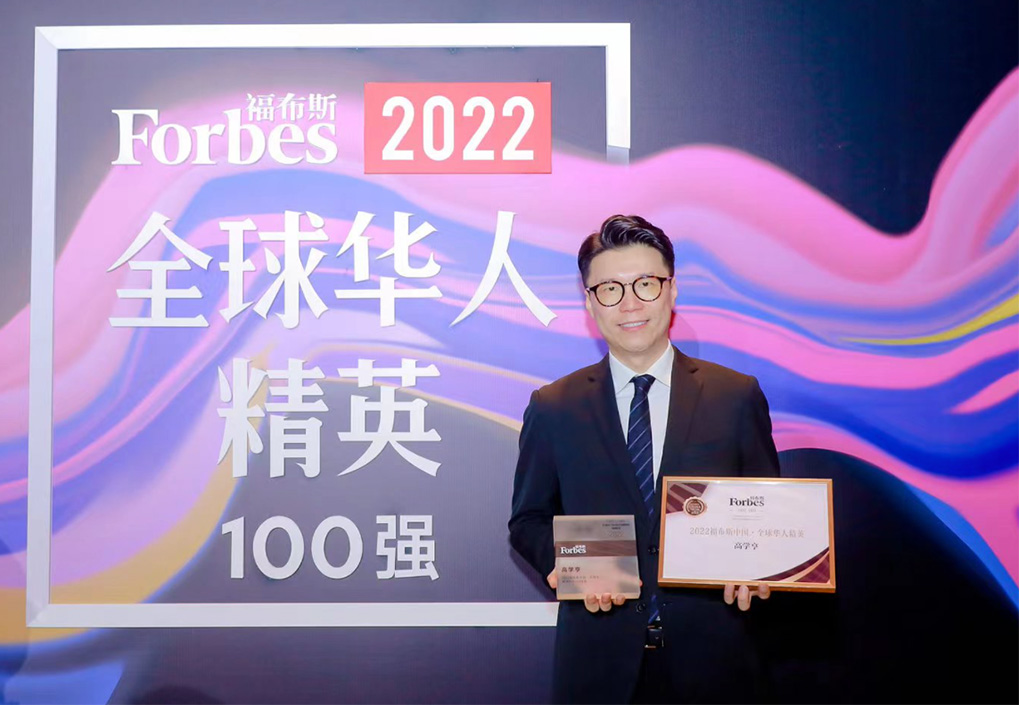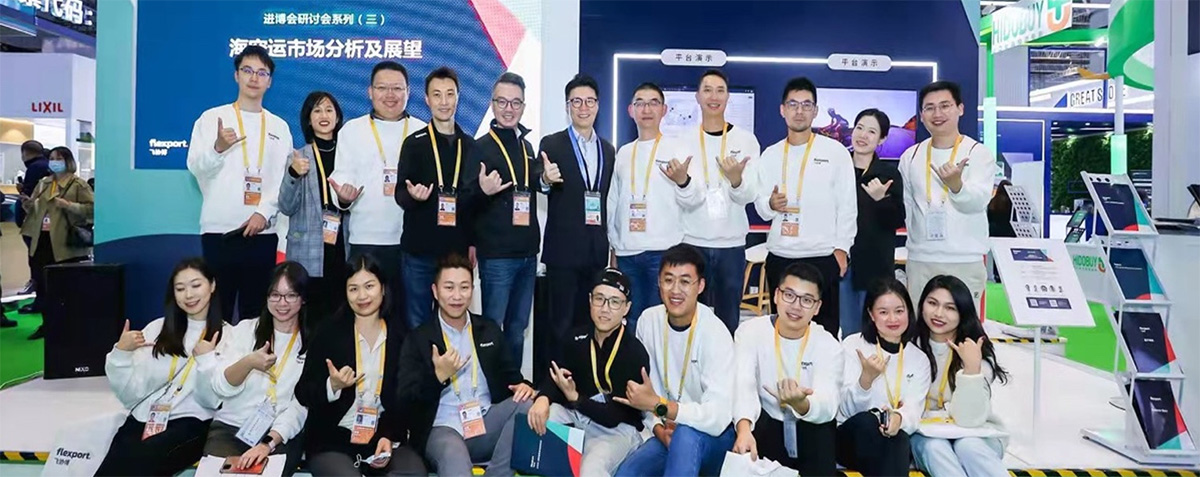Henry Ko is Vice President of Corporate Development APAC and Chairman of Greater China at Flexport, and was named as one of the “Global 100 Outstanding Chinese” by Forbes China in 2022. Henry graduated with a BBA Quantitative Analysis for Business in 1999 and EMBA in 2007, both at the College of Business. In a glittering career in logistics Henry has constantly looked for new challenges. We caught up in Shanghai, as he visited some of Flexport’s 700 employees, and attended the China International Import Expo.
Interview by Eric Collins

How did you first arrive at CityU?
I enrolled at CityU for a BBA Qualitative Analysis Business (QAB) under the Department of Management Sciences. CityU education equipped me with what the commercial world is actually looking for. It was also very much a mathematical analysis and business treatment sort of education, so I cannot say it was a completely eye-opening experience but definitely a good opportunity to step up and try my business logical sense. I remember very clearly on the last day of the school, the QAB Course Director, Dr Gang Hao, shared with us on how to adapt academic models into real-life experience. Dr Hao said the last word that she can offer to us is “lifelong learning.” The life journey has lots of changes and nobody can really guarantee that whatever you learn can truly make your success. The whole mentality is that you have to keep learning continuously to apply yourself, to equip yourself with new knowledge.
Where did you start work?
After graduating I was stationed in Guangzhou for four years and started to learn how to run a manufacturing plant but also to ship cargo to the rest of the world. After four years in mainland China I started to figure out that I need to return to Hong Kong. At that time, I remembered the words of Dr Gang Hao, so I did my research and looked at what would really add value for continuous learning, and I picked the MBA at CityU. When I went through the application process, and interview, the professors looked at my profile and said “Oh Henry with your strategic experience you should challenge yourself and go for the EMBA.” I thought the exposure and the seniority in terms of learning partner might be beneficial and enjoyed studying on the EMBA.
How do you set challenges for yourself?
After that I joined Li and Fung, and then SF Express, big multinational companies. One day I went hiking with one of my EMBA classmates. We had both been pretty quick and successful in our careers. Hong Kong was changing. China was changing with lots of manufacturing moving away. We asked ourselves how can we set a challenge to get to the next step? We realised that Hong Kong’s unique position is the rule of law, and the fact of its being a financial centre. The EMBA already covered the financial side. Immediately after the hike we had a couple drinks. Later we went to CityU courses fair, and soon after enrolled for the Juris Doctor in Law. That was the beginning of a further 6-year part-time study at CityU. It was a very different journey to business study, which is often about business models, proof of concept, etc. With law you really have to soak up the details. It’s about accuracy. You have to memorize and challenge yourself in logical thinking because you can act as plaintiff or defendant. You have to look at both sides before reaching a conclusion, so it’s very good for training your logical mind.
How did you get to your current role?
A friend introduced me to the founder, Ryan Petersen, and we got into dialogue and tried to figure out what the future supply chain ecosystem would look like, globally and also in China. We believed it would cover three specific elements: number one was whether the business model was online & offline integrated. Second, whether the business model really enabled big data, and third whether it had an internet+ solution. Working with previous companies such as Li and Fung, we had already figured this out but executing with established multinational companies meant going through massive transformations in order to embrace this kind of business model. Flexport was a completely new startup. They had a strong vision to make the supply chain easy for everyone and had successfully concluded initial Series A funding. We met in China and figured out what the specific business model for China was, and how that could be injected into their business model. From my side, I had to decide should I go with a startup like Flexport at this stage, or stick in my comfort zone?
Why did you decide to work for a startup?
At that time startup models were popular in the west, but not so much in Asia, least of all in Hong Kong. Nobody had a clear view as to how startups could impact different industries. I shared my dilemma with one of my mentors, an ex-boss at DHL. He said “Why not go for it? You can take a risk for 5 years, just invest for a limited period.” So, I immediately decided to go for Flexport. I was the first employee, and the first in Asia. Nowadays we have over 700 employees, with multiple offices, Hong Kong, Shanghai, Shenzhen, Singapore and Taiwan.
What is Flexport’s competitive advantage?
Flexport is the first technology-driven freight forwarder. The key point is that to this day multinational companies are still using traditional ways of running supply chain operations. The supply chain is full of paper, printing, communication through mobile phone, email, Excel spreadsheets, calculators and so on. Sometimes you can still find fax machines as one of the key tools for running international logistics! As a technology company Flexport had a platform offering true visibility of every single cargo shipment. Every single process is tracked with real-time visibility, through export clearance, ocean transportation, import clearance, and then to distribution. Every single milestone is tracked with real-time visibility. You can see inventory, ocean/ air, real time, carbon emissions and container utilisation within a single platform. We are also running operations physically offline, in terms of transport charter, warehousing, etc., again all fully integrated. It’s a seamless experience in what used to be a very fragmented industry. To this day, there is no single player in the market who is running an operation like Flexport which is pretty much recognised as a leader in the digitalization of freight forwarding in international trade.
What sort of talent is Flexport trying to attract?
To be honest this industry is not sexy at all. A lot of talent goes for the Big 4 or ibanking. No one would think of going for freight forwarding. So, it’s difficult to attract talent. And without talent, it’s hard to innovate and continuously develop the industry. In the early days, I didn’t have an office. All I had was a printed name card as I held multiple interviews over coffee in shopping malls. People wanted to know Where is your office? How big is your company? What are the benefits? They never want to think about taking risks. In Hong Kong it’s still really about compensation. They are not convinced by business models.
After a few months, when we had our business license, an office and so on, we started to look again for fresh graduates from different universities. Three of the earliest cohort were quite unique, and I arrived at them after interviewing 172 candidates. The first was a 100% local graduate, the second a mainland talent with masters’ degree, and the third a European Chinese born in Italy, with two years’ experience in the US who had then studied in Hong Kong for a masters’ degree. These three really understood why Flexport was formed and how we are going to change the industry. They saw it as a burning opportunity to build their career with a startup. Having established this talent as a benchmark, we continued to build our recruitment at this or a similar standard.
How fast did Flexport grow?
Since then we have doubled our employee count every three to four months. That means you become a new company every three to four months. New talent needs to go through a learning curve, lots of process alignment, knowhow on how to run the business. And the majority of our employees were fresh graduates in the early days so we needed to encourage them to have a self-learning mentality. They needed to be very hungry for knowledge but also figure out how they could add value to the company’s overall interest, not to be shy of innovation opportunities, and offer specific processes to improve the customer experience.
We believe productivity depends on mindset and culture. 80% of our employees come to us with no prior supply chain industry knowledge. We welcome diverse backgrounds, outside-the-box perspectives and problem-solving mindsets.
Do you see a big step change coming in the next five years?
Definitely. There are so many destabilizations such as deglobalization and the pandemic, and the change of the retail model towards online consumption. So, all of that brings destruction to the global supply chain and creates opportunities. Lots of buyers and sellers in the supply chain are looking for more agile solutions and better digitalization solutions. For example, if there is a shortage in one specific location, that should be visible on the platform and the client can see the options in terms of transportation and make the decision and act on one single platform. No need to go for the traditional route of looking for rates enquiry, maybe looking at the spreadsheet for the internal system, comparing the inventory here and there. It’s a completely different game in this industry now.
Then there’s ecommerce. Back in 2016 it only accounted for 6% of global retail distribution. In 2023 it could account for 20%. The pandemic has greatly accelerated the development of ecommerce consumption. If you have an item which suddenly becomes very popular in the US and it is manufactured in China, the logistics solution has to be an ecommerce-enabled platform offering an agile, flexible, international solution.
Another interesting opportunity is that digitalization generates a lot of data. This can be used in leveraging lots of value-added services, for example automation of customs clearance. It can also enable insurance products or trade finance products, including risk assessment. So, technology is moving us well beyond the traditional international transportation sector producing a seamless world.
